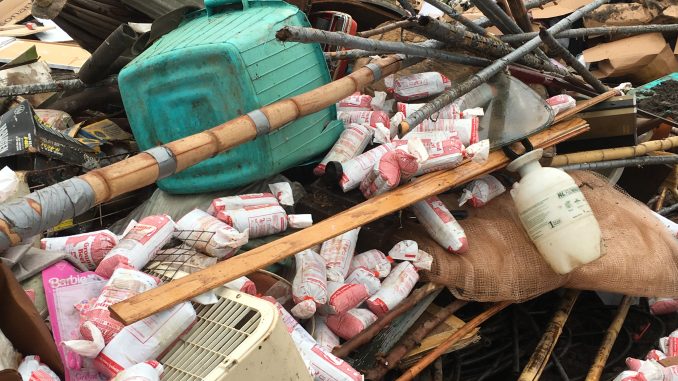
Just about everything people throw away has a place at the Neal Road Recycling and Waste Facility. Mattresses, appliances, bicycles and batteries are all systematically sorted and diverted into the proper recycling streams at the 200-acre landfill south of Chico.
Food waste, however, mostly goes into the landfill. But that is changing under California’s SB 1383, or Short-Lived Climate Pollutant Organic Waste Reductions, which aims to reduce greenhouse gas emissions—namely, methane—produced by organic waste in landfills.
Under the law, which went into effect Jan. 1, 2022, local governments across California must reduce by 75% the amount of organic waste that ends up in landfills by 2025. That’s far easier said than done in Butte County, which does not have a composting facility that can handle food scraps mixed with yard trimmings.
“For my home in Chico, I have garbage collection, curbside recycling and a yard waste bin,” says Eric Miller, manager of Butte County’s waste management division. “Now, we’re supposed to theoretically put food waste in the yard waste bin, but the nearest place for it to be composted under California law is in Yuba County. The challenges to collect residential food waste commingled with yard waste at the municipal level are daunting. The complexities increase when you consider food waste collection from apartments.”
Indeed, the area needs a mixed composting facility that can handle both yard waste and food waste, or at least a system for transporting it to one. “We have yard waste facilities and composting facilities around us, and we have the rendering plant that handles food waste only, but we don’t have a facility close enough that can handle commingled yard waste and green waste,” echoes Linda Herman, parks and natural resources manager for the City of Chico.
The nearest facility that can handle both is located just south of Marysville—a roughly 60-mile one-way drive. Chico is working with Butte County to develop a transload operation at the Neal Road Recycling and Waste Facility, where such waste could be brought to the landfill, loaded on trucks and transported for processing.
“Our biggest concern is that we do not have enough facilities locally to handle some of the components of the law.”
Linda Herman, parks and natural resources manager for the City of Chico
Other municipalities are also gearing up for big changes. Oroville is on track to “start pulling organics out of the waste stream,” they have amended their franchise agreement with waste-hauler Recology, and are working on the expansion of their edible food collection program to include all commercial generators in 2023 and all residential generators in 2024, says Jennifer Arbuckle, a local consultant who helps local governments with SB 1383 compliance.
Chico is under a notice of intent to comply with SB 1383 and must be fully in line by March 2024, Herman says. Chico could face fines if it doesn’t hit that deadline, but the city has been working with CalRecycle on its compliance plan that it aims to execute by December.
“Our biggest concern is that we do not have enough facilities locally to handle some of the components of the law,” Herman says. “The biggest one is residential food waste. We don’t really have the space. Homeowners don’t have the space for a fourth container, nor do we want to bring a fourth truck into the mix.”
As a result, many residents are confused about where things stand, especially if they have lived in more urban areas of California. In the Bay Area, for example, people are already used to mixing yard trimmings into compost. “Why can’t I mix my yard trimmings and compost in the same green bin?” Herman says. “Why can’t I put my lettuce head or my carrot sticks in there? It’s organic waste, right?”
Though local municipalities are facing a long process of developing infrastructure in order to comply with SB 1383, the time is coming soon when residents can mix their organic waste together in their green bins. In the meantime, Arbuckle encourages all county residents to be mindful of putting their waste in the correct bins and avoiding contamination. Under SB 1383, cities must also monitor trash bins to reduce crossover between waste streams—and possibly fine residents who aren’t in compliance.
“What goes where is very important,” she says. “If people are putting recycling in the trash, then we have a problem and it becomes the city’s responsibility to investigate. We can’t take food scraps at this point, but people do have to stay very diligent about putting the right material in the right bin.”
Learn more at www.buttecounty.net/publicworks

